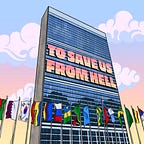The situation in Southern Lebanon is extremely precarious. Israel is positioning more and more military assets along its northern border, while Hezbollah continues its near-daily attacks on Israeli targets from Lebanon and has threatened an all-out war. Caught in the middle are about 10,000 United Nations peacekeepers.
The United Nations Interim Mission in Lebanon (UNIFIL) has more peacekeepers deployed per square kilometer than any other UN peacekeeping mission in the world. These peacekeepers have helped avert an all-out war between Israel and Hezbollah in the past, but tensions are very high right now. If conflict is averted, it may be due to the off-ramp to continued escalation between Hezbollah and Israel that UNIFIL provides. On the other hand, if Israel and Hezbollah decide to escalate, there’s little these peacekeepers can do to stop them.
The lead segment of our second episode of To Save Us From Hell explains the role of UNIFIL in managing conflict between Israel and Hezbollah since 2006 and why some diplomats are considering expanding UNIFIL to prevent a new devastating war in the region. On the flipside, we also discuss what would happen to these 10,000 Blue Helmets if they get caught in the middle of a war between Israel and Hezbollah.
Our second segment focuses on a summit this week between Taliban officials and representatives of about 30 governments and international institutions, convened in Doha under UN auspices. This meeting is somewhat controversial and has earned reprobation in some circles for the fact that no Afghan women will be represented.
Finally, we share an excerpt of our interview with Courtney Fung, an academic who studies Chinese diplomacy and its approach to the United Nations. This is a 15-minute excerpt of our full 40-minute interview that is available to our paying supporters. The interview covers China’s evolving relationship to the UN, including how the policies and strategies it pursues are changing as it becomes a more robust global power.
To Save Us From Hell is available wherever you get your podcasts including Apple Podcasts and Spotify.
And hey, look! The good folks at Spotify are loving our show!
This show is going to be a hit and we’d love your support as we get this project off the ground. To Save Us From Hell is funded entirely through the support of our audience. To get full access to To Save Us From Hell, including the full episode about China’s intentions at the United Nations and future bonus content please get a paying subscription.
As always, please let us know what you think of this episode by joining our chat.






